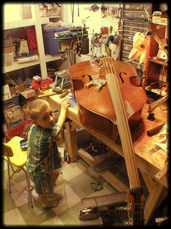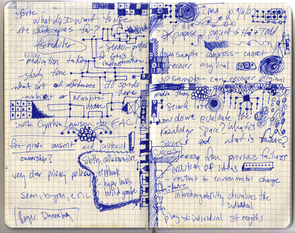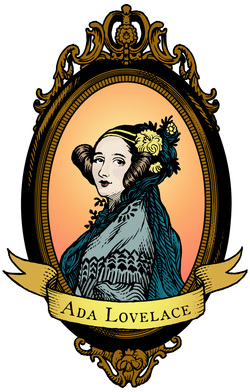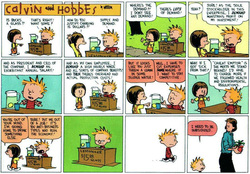 Inspired by Ms. Winegardner scoring our students tickets to Joshua Bell, I give you this short video lesson idea to teach a thinking skill. It is more a quick "hook" to introduce a higher order thinking practice to your students within whatever larger lesson you are teaching. Use it when you want to have students be more aware of their surroundings, their thought processes, external cues to when something is " important", etc. I can make this fit almost any curriculum. It meshes nicely with reading strategies taught in Here's the video introduction and link to the news story about it. Will one of the nation's greatest violinists be noticed in a D.C. Metro stop during rush hour? Joshua Bell experimented for Gene Weingarten's story in The Washington Post (Video by John W. Poole)
0 Comments
 This article was posted recently and I agree wholeheartedly with this method of flipping. http://www.edutopia.org/blog/flipped-classroom-in-class-version-jennifer-gonzalez As some evidence for rethinking homework, I give you this DATA (Look, Ma! Data!) Only 3 of a roomful of 38 district level leaders did their homework for a very important 3 day training! Don't be so offended when students don't do yours and note that many of them may be faking it or may have cheated. For me in class flipping is a great way to get rid of that and be more "montessori" in the approach to homework which fits with the reality of the world today -- adults' worlds as well as kids'.  Let your student decide: The Piedmont Tau-rates doesn't have the same ring to it as Piedmont Pi-rates, and I don't know if we do it on June 2 or February 6 but : here's Vi Hart's explanation why Pi is wrong and Here's Numberphile's Pi/Tau Smackdown in case you want to share with students and get their opinion If they side with team Tau, Click the Tau image to go to the Tau Day website  Yummy Math is a site all about math food problems. Check it out just in time for Pi(e) Day! http://www.yummymath.com/  Close reading is a good way to get students to develop critical thinking and ask logical questions as a starting point to good research. It teaches metacognition about what and why we annotate as we read. In our Balanced Literacy PD, I demo'd a Diigo-annotated web article as a tool for close reading, in that situation as prep for a socratic seminar discussion. Diigo lets the user highlight the webpage and place sticky note comments electronically, so it is great for paperless close reading, for gathering your thoughts, or for sharing collaboratively. As a PD Facilitator, I use the annotated URL link so others will notice just the sections I highlighted in a longer article that I only am interested in part of. This video below give you a one minute intro to accessing Diigo's annotation services: )  Read this article with your students. http://www.livescience.com/43455-lego-braille-printer.html Curriculum connections:
 Do you know who the woman in this illustration is? She's important to what you are using right now. March is Women's History month. here are several ways to integrate women often forgotten into your lessons (including women in tech like Ada here who invented coding before computers were even invented- click the image to know more about her) Who chooses who is important enough to be studied? Do your students see themselves in the people of your discipline? Ask them. http://www.csmonitor.com/USA/Education/2014/0308/How-teachers-bring-women-s-history-and-women-s-rights-to-life-video  One great way to engage students is let them do a web search of any topic in your curriculum. To help develop their critical thinking, evaluating and website assessment skills, and to build their Tier 2 vocab, a pre-search is a good first step. It is also part of balanced literacy as you are modeling for them and thinking with them. This article gives 15 tools and a choice of steps you can use to teach via pre-search. Students knowing the right words when searching is an important part of finding the right sites. You can also use Google 's advance search. |
Categories
All
Author I am Lisa Gurthie the PD facilitator at Piedmont IB Middle School. She specializes in tech and arts integration, interdisciplinary, holistic education, and unschooling school to make it more real and relevant. One day I will modernize my "about" page. Check out the other blogs on this site for Lesson Ideas, Celebration of Good Teaching, and Piedmont PD Archives
February 2021
Categories
All
|
Photos from citymaus, The All-Nite Images, Lindy Buckley, peasap, Claudio Gennari ..."Cogli l'attimo ferma il tempo", mikemariano, faungg's photos, frankieleon, Chris Piascik, Kurisu, familymwr, kc7fys, el_itur, cowbite, eilonwy77, pestoverde, Marcin Wichary, Postmemes.com, alexliivet, UK in Italy, JoeInSouthernCA, Nathan O'Nions, jimmiehomeschoolmom, surreynews, Hans-Jörg von Schroeter, Bekathwia, CarbonNYC, marc falardeau, conorwithonen, LeonArts.at, Nina Matthews Photography, Georgie Pauwels, cwwycoff1, dullhunk, The All-Nite Images, Castles, Capes & Clones, warrenski, juhansonin, Ke7dbx, Muffet

 RSS Feed
RSS Feed
